Simplifying Life Insurance in India
13 Developmental Milestones of a 12 Month Old Baby
Monitoring how your baby moves, plays, walks, and responds is vital. Every guardian is concerned for their child's proper growth and safety in their growing years. There are a few common things that all babies do by the time they're 12 months old. These 12 month milestones must be checked and celebrated.
Is your child's growth a concern for you? Then, read the article to learn about the 12 month developmental milestones and detect the problems in growth and cognition.

Table of Contents

What Most Babies Do by 12 Months of Age?
A developmental milestone is a discrete cognitive or motor ability that we expect to see accomplished in a child of a particular age. By 12 months, most children can sit alone and pull themselves up to a standing position. Creeping, crawling, and walking along furniture will give way to independent walking.
Many babies may take their first steps independently by the time they are 12 months old. This age group of babies is usually active, and infant development happens quickly at this age.
12 Month Milestones & Development Checklist
1. Movement Milestones for a 12 Month Old Baby
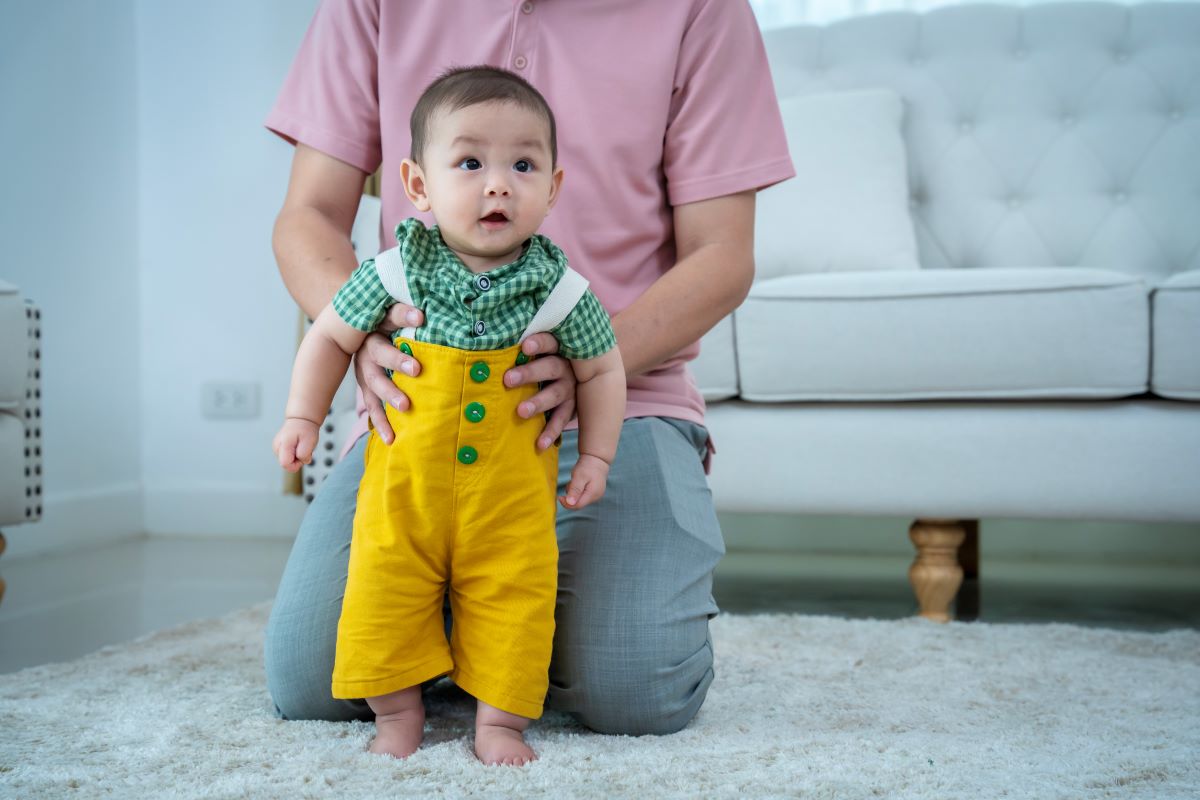
Movement Milestones for a 12 Month Old:
By 12 months, most children will have attained a few of these movement skills that highlight strengthening their body muscles. The baby can achieve the following movement milestones:
- Standing Alone: Can stand without support for a few moments.
- Cruising: Walks while holding onto furniture or pushing objects.
- First Steps: Take a few independent steps with or without support.
- Sitting Down: Can sit down from a standing position with control.
- Climbing: Shows interest in climbing onto low furniture or steps.
2. Visual and Hearing Milestones for a 12 Month Old Baby
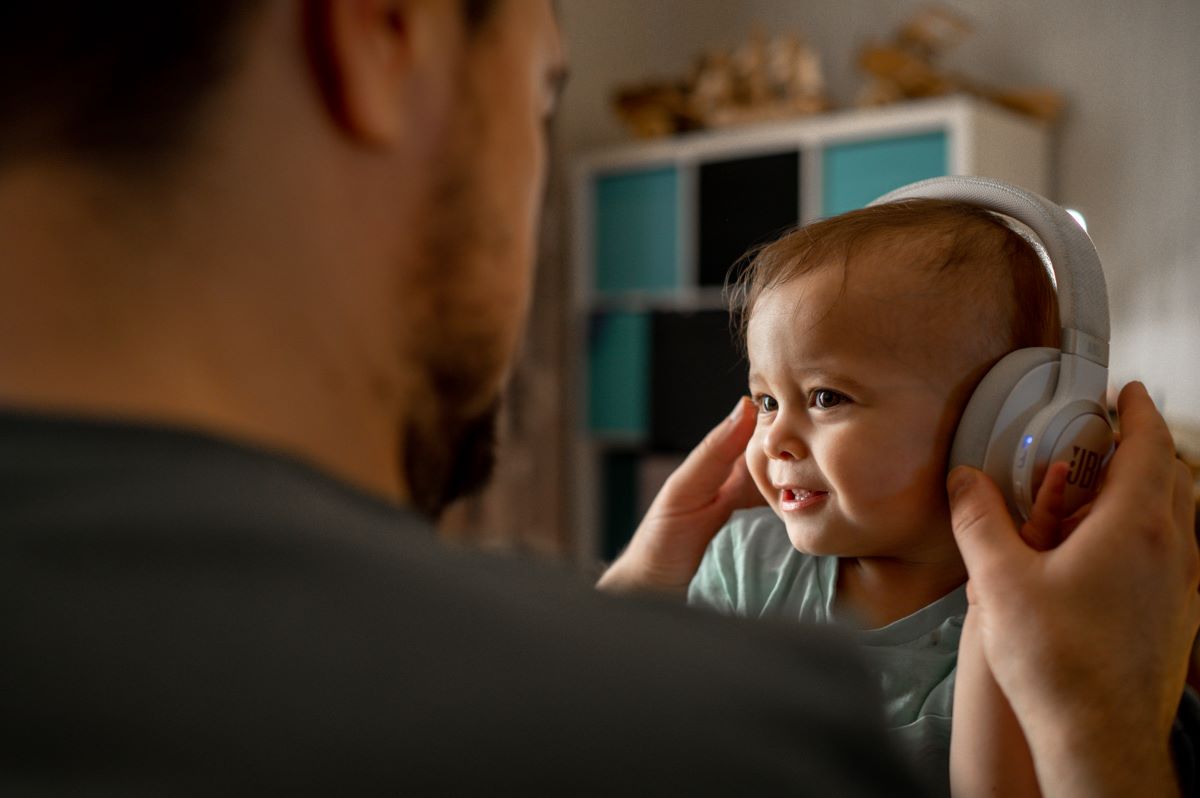
Visual Milestones:
By 12 months, babies can track moving objects smoothly and recognise familiar faces and objects from a distance. Their vision allows them to explore and engage more effectively with their surroundings.
- Can track moving objects with smooth, coordinated eye movements.
- Recognises and responds to familiar faces, such as family members.
- Shows interest in and reaches for toys or objects, indicating improved hand-eye coordination.
- Can differentiate between different colours and shapes and may exhibit preferences for specific ones.
- Look for hidden objects, demonstrating object permanence.
Hearing Milestones:
At 12 months, babies can localise sounds, turning their head or body toward the noise source. They also respond to their name and can recognise familiar words or phrases, showing an increased understanding of verbal communication.
- Respond to their own name and common words or phrases, like "no" or "bye-bye."
- Turn their head towards the source of a sound, such as a doorbell or a voice.
- Reacts to the tone of voice and enjoys listening to songs or rhythmic sounds.
- Imitates simple sounds and may begin to babble with more varied sounds.
- Understand simple instructions or gestures, such as "come here" or "wave bye-bye.”
3. Smell and Touch Milestones for a 12 Month Old Baby
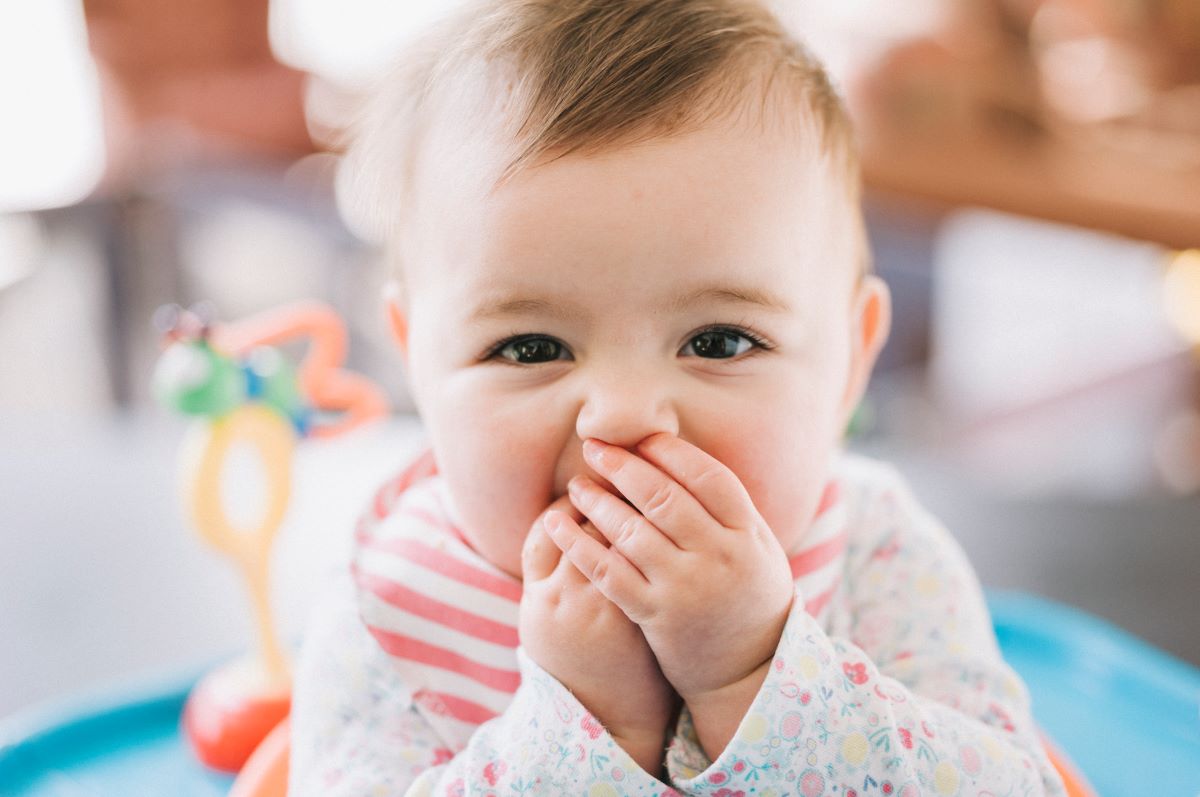
Smell Milestones:
By 12 months, a child can achieve the following smell milestones:
- Shows preferences for familiar, pleasant smells, such as those associated with their caregivers or favourite foods.
- Reacts to unpleasant or unfamiliar odours with facial expressions or by turning away immediately.
- May become more attentive to the scents of different foods and show interest in their taste.
Touch Milestones:
By 12 months, a child can achieve the following touch milestones:
- Explores objects by touching, grasping, and manipulating them, indicating improved tactile sensitivity and fine motor skills.
- Shows preferences for certain textures, such as soft, smooth, or rough, and may seek out or avoid different textures.
- Demonstrates comfort with familiar tactile sensations, such as being held or cuddled, and may show curiosity about new sensations.
- Can discriminate between various tactile experiences, such as hot vs. cold or soft vs. hard.
4. Sleep Milestones for a 12 Month Old Baby
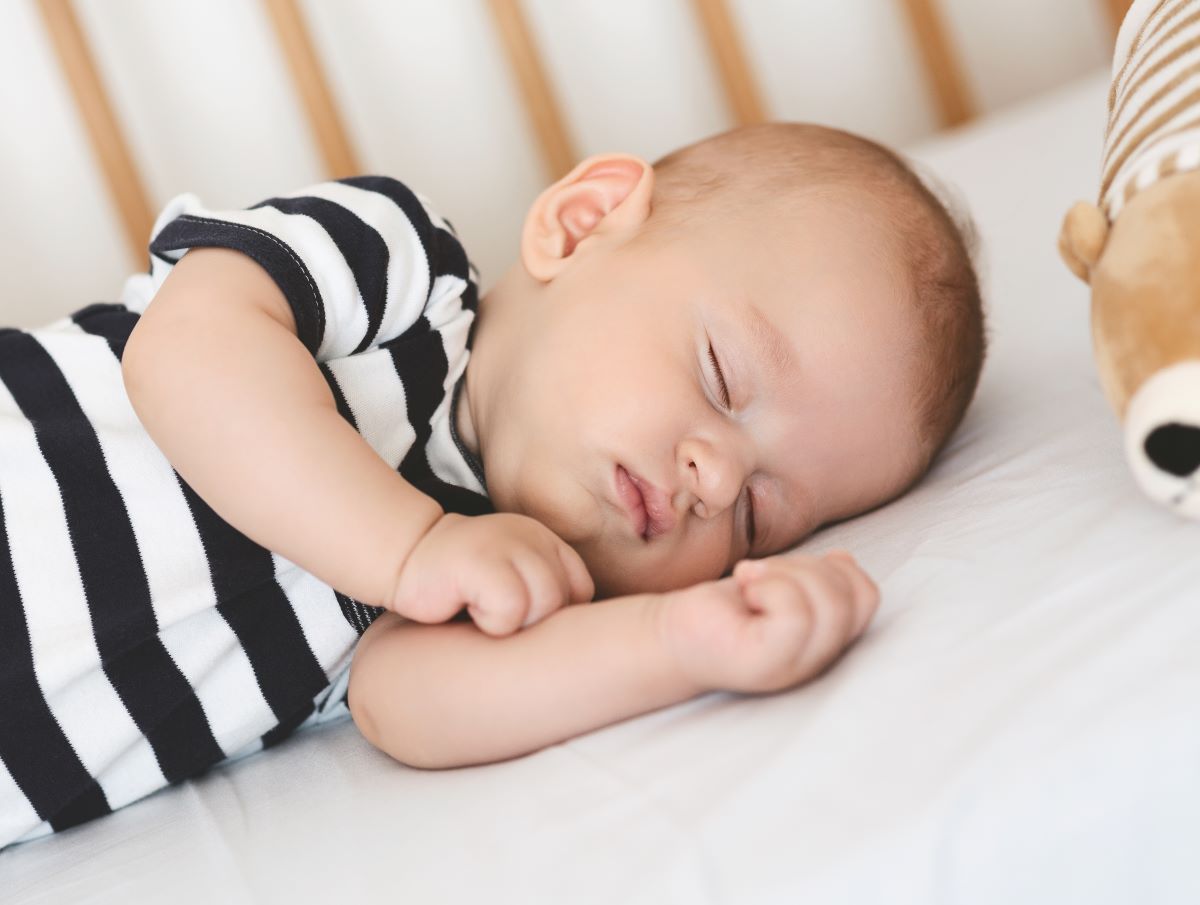
12 Month Old Baby Sleeping Patterns:
At 12 months, even though most sleep patterns have stabilised, monitor:
- Night Wakings: Babies wake at night regularly. However, it can be an issue if this occurs more frequently than every second or third night.
- Nap Transitions: Continue monitoring for overtired signs or the inability to fall asleep with this transition, which indicates that nap timing or duration needs an adjustment.
- Sleep Environment: Maintain a sleep environment that supports sleep, with a consistent bedtime routine and a safe sleep space.
- Sleep Regression: Watch for sleep regressions, which can occur at milestones, changes in routine, or disruptions.
- Daytime Sleep: Monitor good daytime sleep; failure to do so leads to crankiness and then difficulties with nighttime sleep onset.
The ability to fall asleep can improve early on, and then sleep stays healthy.
5. Health Milestones for a 12 Month Old Baby
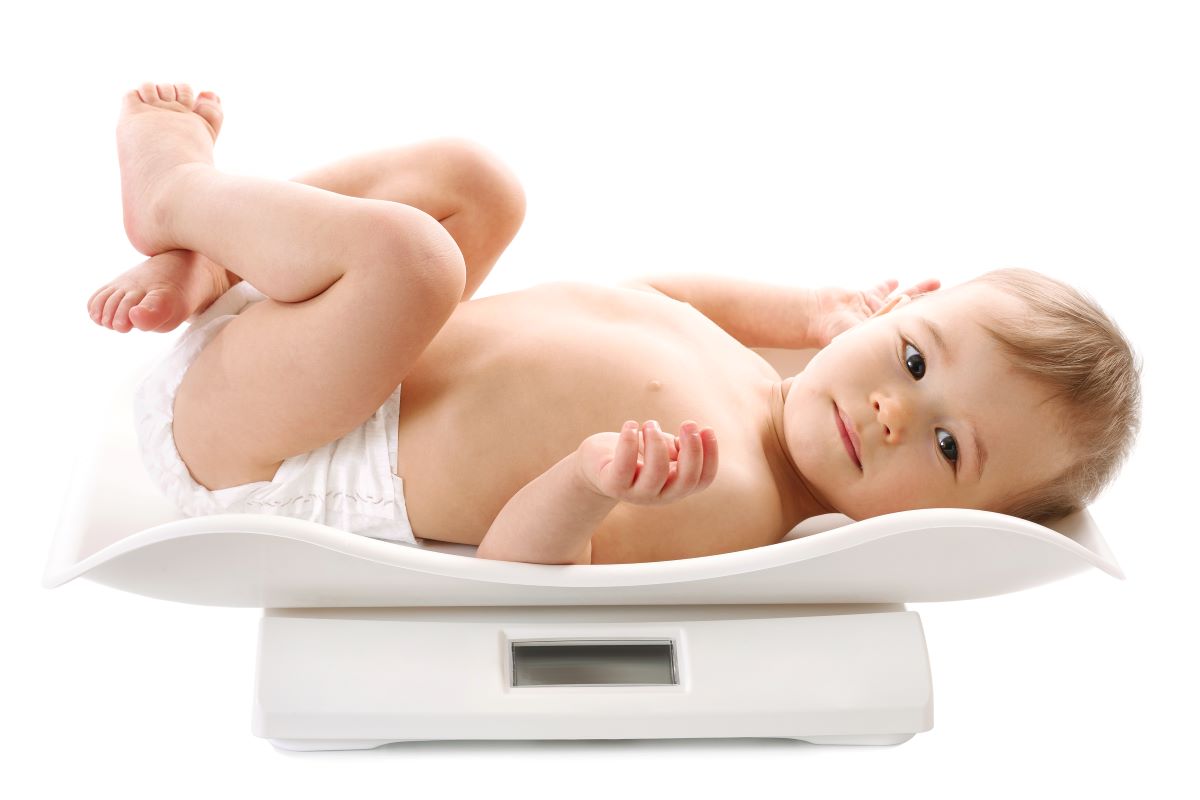
Here's a chart outlining typical health milestones for a 12 month old:
These values represent typical ranges, but individual variations can occur. Regular check-ups with a paediatrician will help ensure your baby is on track with their growth and health.
6. Feeding Milestones for a 12 Month Old Baby

What to Feed:
- Solid Foods: Finely chopped fruits, vegetables, meats, and grains.
- Finger Foods: Soft, bite-sized pieces like pieces of cooked vegetables, fruits, and cereal.
- Dairy: Whole milk, cheese, and yoghurt.
- Protein: Eggs, beans, and tofu.
- Grains: Iron-fortified cereals, pasta, and rice.
7. Schedule and Routine Milestones for a 12 Month Old Baby
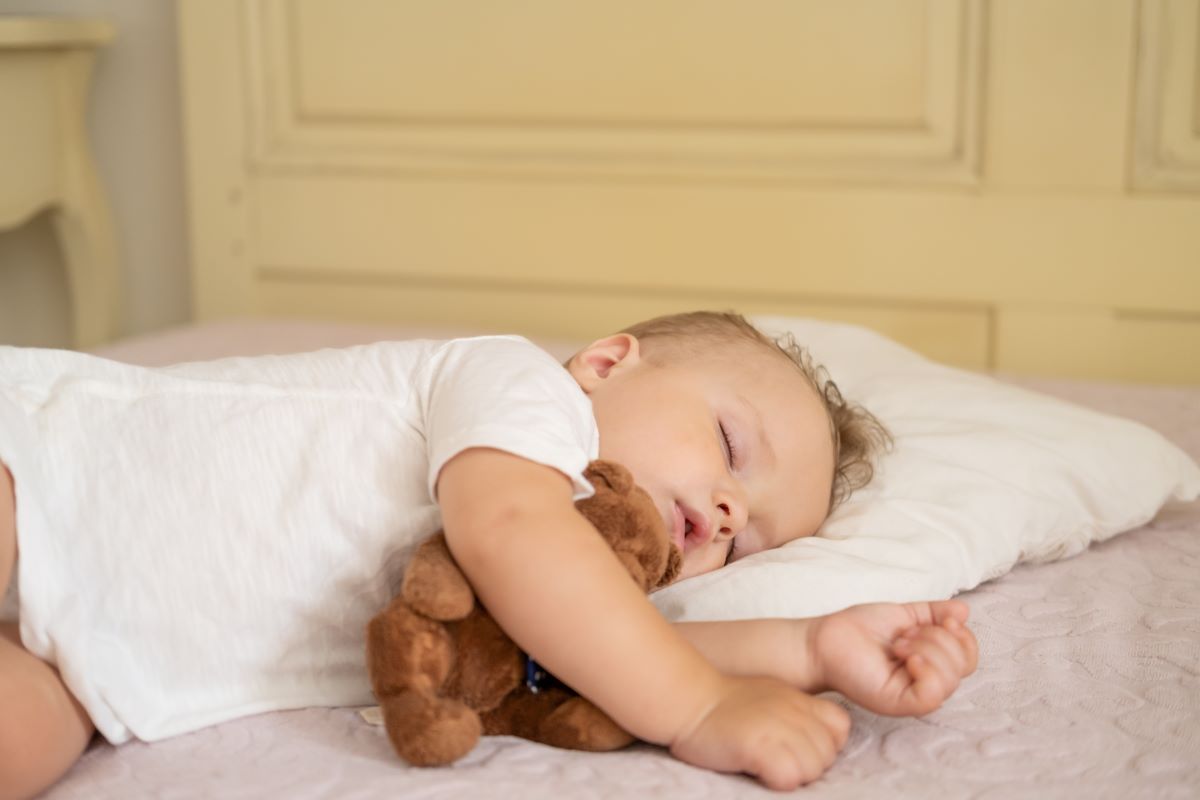
Here’s a condensed daily routine for a 12 month old baby:
This routine balances feeding, sleeping, and play to support the development and well-being of a 12 month old.
Maintaining a consistent routine helps signal the baby that it’s time for sleep and supports better sleep habits.
8. Cognitive Milestones for a 12 Month Old Baby
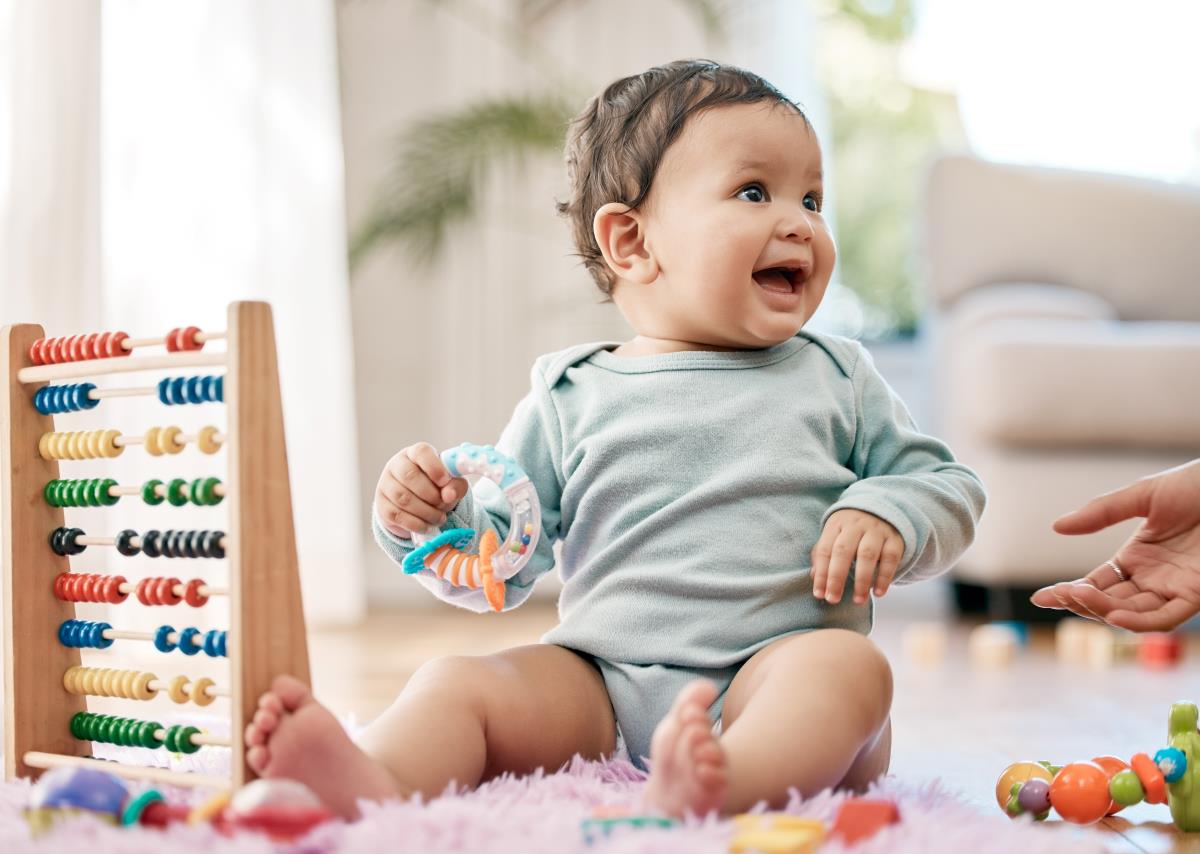
How to Help with Cognitive Milestones:
- Play Peek-a-Boo: Reinforce object permanence by hiding and revealing objects or faces.
- Cause-and-Effect Toys: Provide toys that respond to actions, like buttons that make sounds or lights.
- Encourage Imitation: Model simple actions and gestures for your baby to mimic and copy.
- Interactive Games: Engage in problem-solving games, such as shape sorters or stacking blocks.
- Read Books: Reading picture books enhances recognition and understanding of familiar objects and people.
9. Social and Emotional Milestones for a 12 Month Old Baby
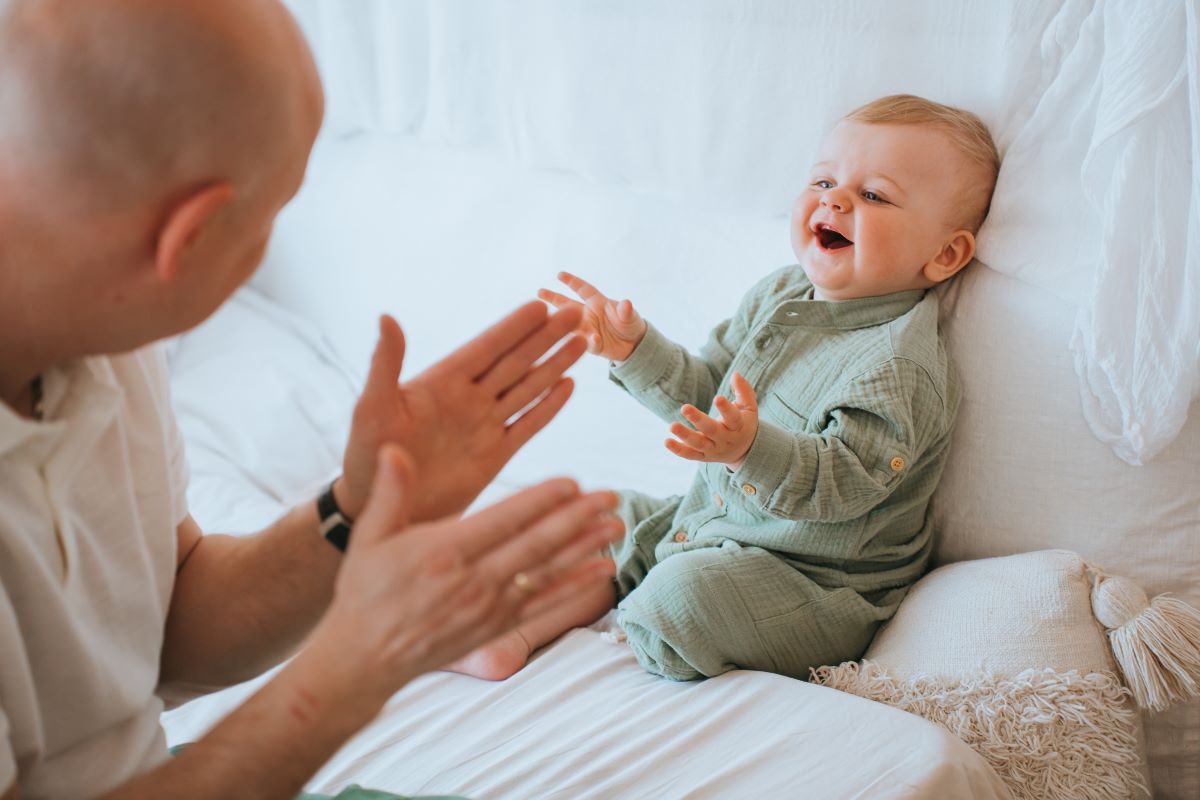
Factors of Social and Emotional Milestones
- Separation Anxiety: Shows distress when separated from caregivers.
- Social Interaction: Engages in interactive games like peek-a-boo.
- Imitation: Mimics social gestures and expressions, such as smiling or frowning.
- Attachment: Displays strong attachment to familiar caregivers.
- Emotional Expression: Expresses emotions, including joy and frustration.
10. Language and Speech Milestones for a 12 Month Old Baby
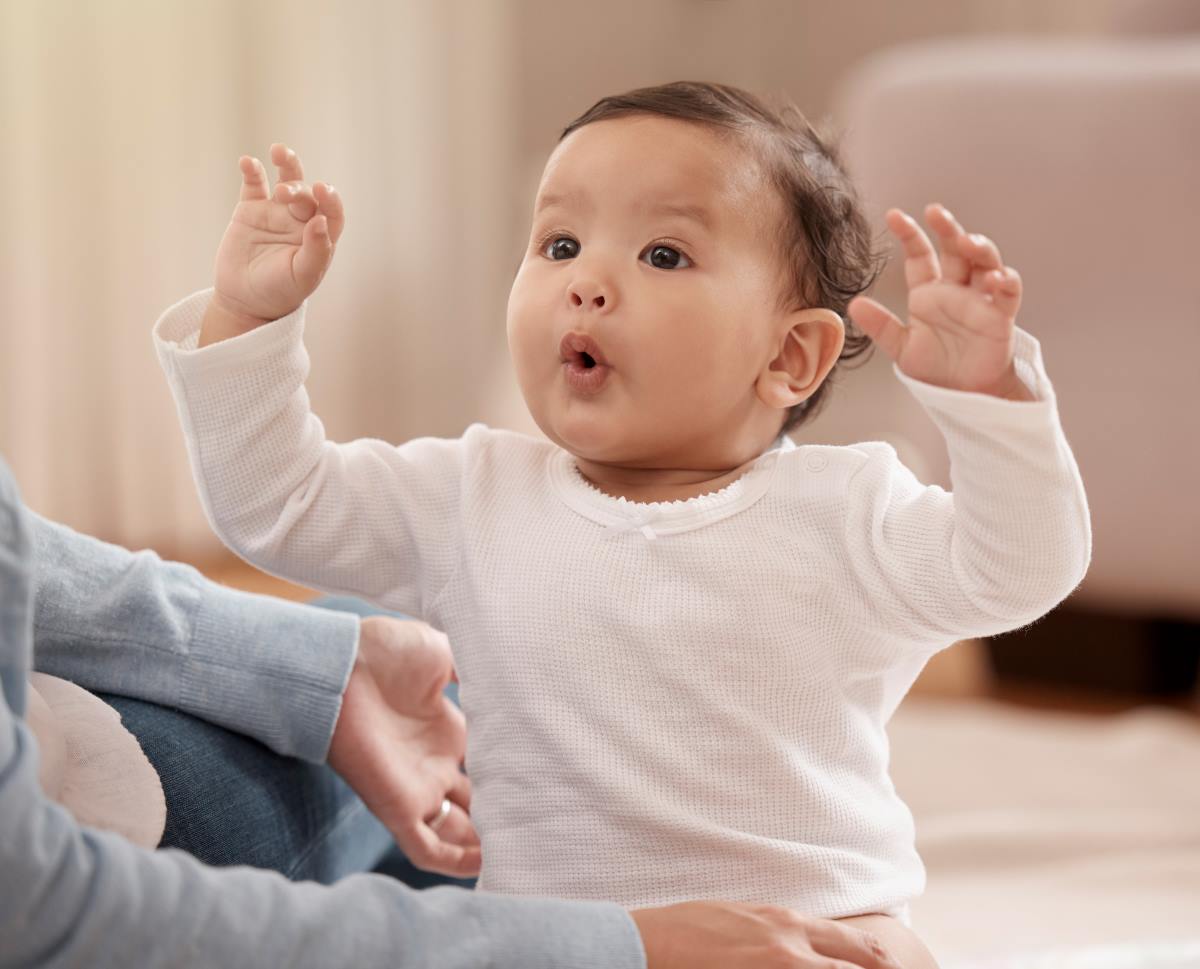
What to Expect:
- First Words: Uses words like "mama" or "dada" meaningfully.
- Simple Commands: Understands and follows instructions such as "come here."
- Babbling: Continues babbling with varied sounds and intonation.
- Receptive Language: Recognises familiar names and objects.
- Imitation: Imitates speech sounds and simple words.
11. Play Milestones for a 12 Month Old Baby
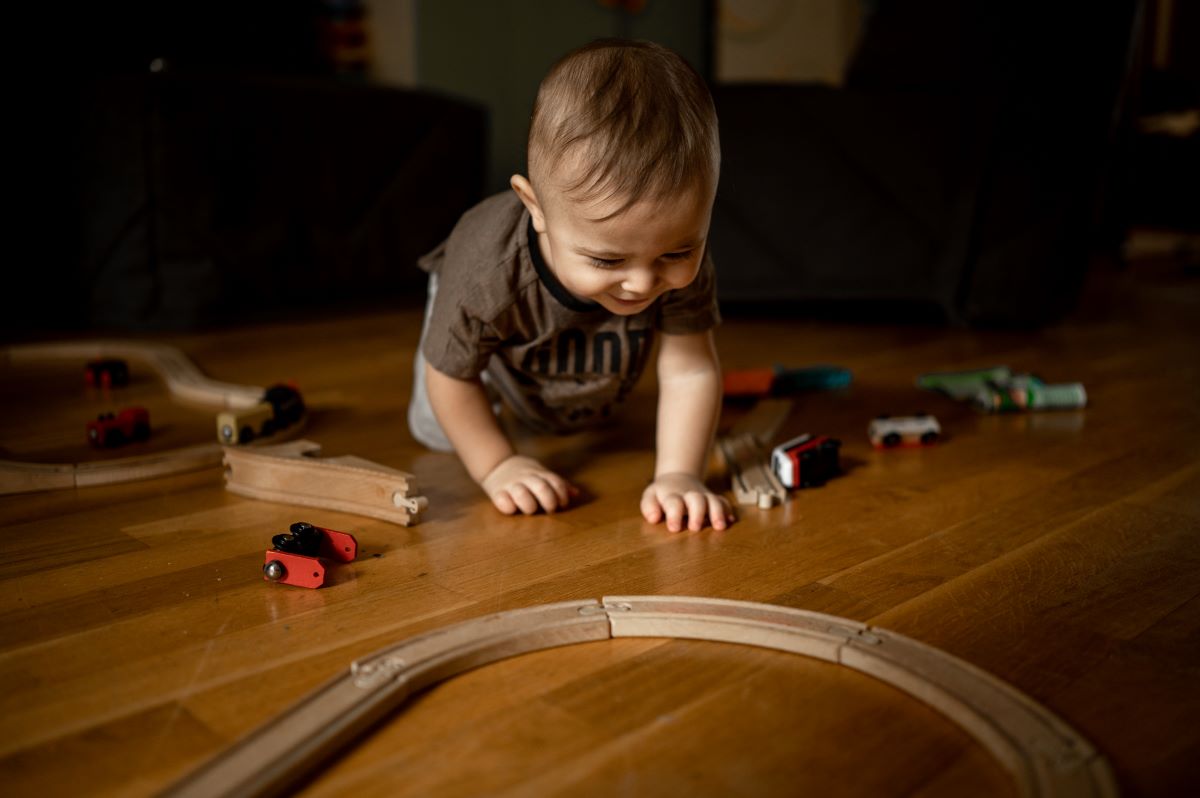
Games to Play with Your 12 month Old Baby:
- Peek-a-Boo: Helps with object permanence.
- Stacking Blocks: Enhances fine motor skills.
- Push Toys: Supports walking development.
- Simple Puzzles: Encourages problem-solving.
- Read Picture Books: Stimulates language and cognitive skills.
12. Physical Milestones for a 12 Month Old Baby
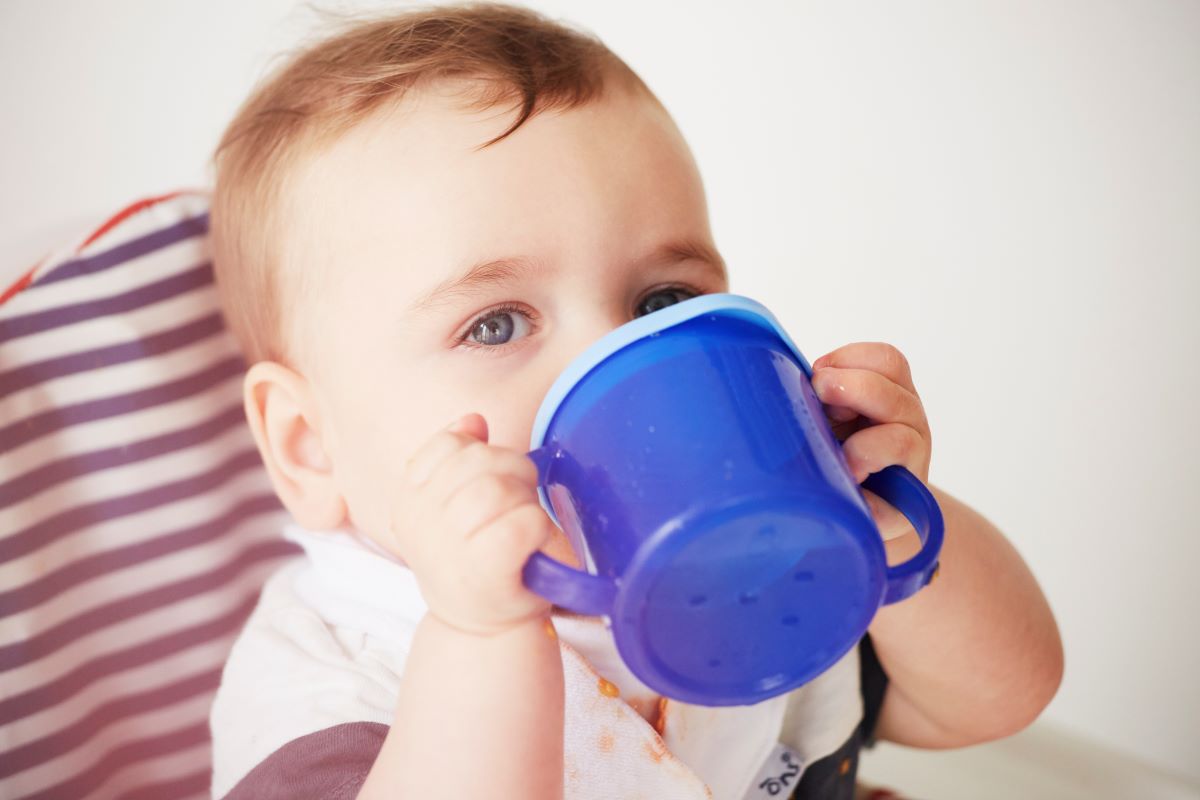
Physical Milestones for a 12 Month Old:
- Standing Unassisted: Stands without support for a few seconds.
- Walking with Support: Moves along furniture or while holding an adult’s hand.
- Pincer Grasp: Picks up small objects using thumb and forefinger.
- Drinking from a Cup: Sips from a cup without spilling.
- Climbing: Attempts to climb onto low furniture or steps.
13. Walking Milestones for a 12 Month Old Baby
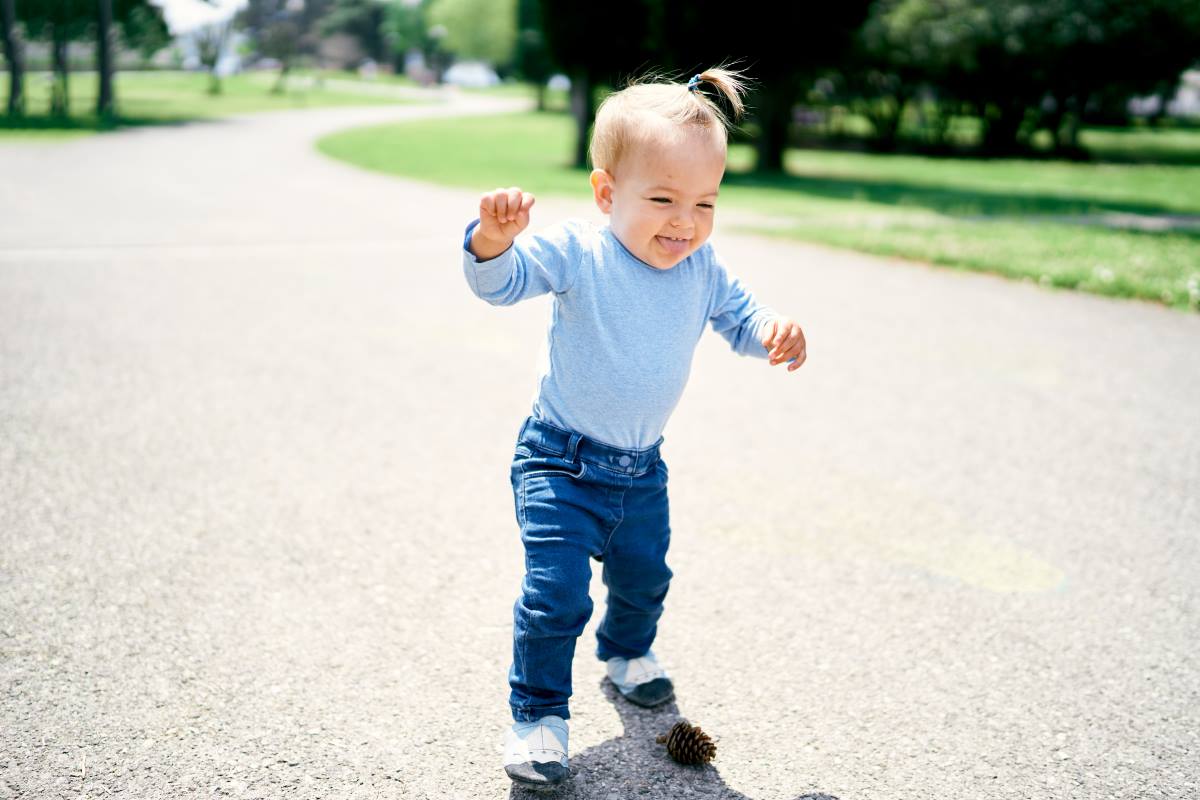
Walking Milestones for a 12 Month Old:
- Cruising: The baby moves along on furniture or stable structures, holding on to the support.
- Taking Steps with Support: Takes steps while holding an adult's hands or using a push toy for balance.
- Independent Steps: Perhaps able to make some independent steps without support, although it might still be unstable.
- Balance: Still increases balance and has a more stable and balanced walking pattern with few falls.
- Explores: More daring in exploring his or her surrounding environment. He or she moves towards the things or people he or she wants to reach.
- Walking Support: Displays eagerness in walking with an adult's support or holding onto some stable objects.
What are the Activities for a 12 Month Old?
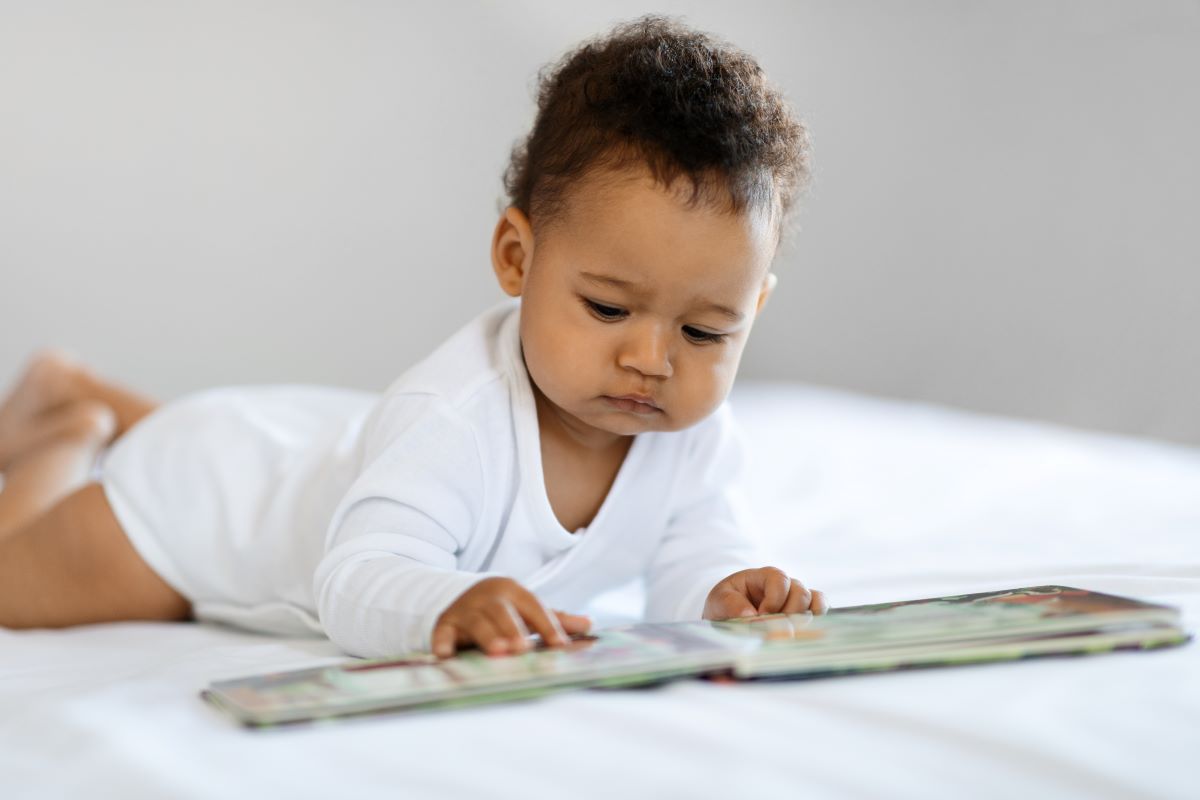
1. Engage in Books
Have an interactive storytelling session. To enhance the reading experience, you can now engage with books in ways other than reading aloud to your child. For instance, ask questions like "Where is the baby?" or "What sound does the duck make?" while pointing to various people and objects.2. Play with Puzzles
A few big, heavy wooden puzzles should be set out, and you should assist your child in solving them. While she could still find it challenging to fit the pieces together at this age, solving puzzles and honing problem-solving techniques can still benefit from playing with them. Remember to compliment them after you're done!3. Take a Stroll
Go exploring outside with your partner! At this age, nature can instruct us in a multitude of ways. Let your kid investigate various textures by letting her feel the grass beneath her feet. Encourage her to pull herself up to a park bench to help her develop gross motor skills. Let her shovel mud or sand into a pail to enhance her cognitive development.4. Narrate Your Activities
This will aid in developing your language skills as you point out and discuss the birds, trees, and other objects in your environment. Have a patty-cake game. Your youngster could play patty-cake by themselves around 12 months old. This clapping game is enjoyable for a one-year-old because their motor skills are developed enough.5. Make a Crawl with Obstacles
Encourage your kid to crawl over, under, and through numerous things in your home to help her develop gross motor skills and better understand the area around her.
A simple technique is to cut off the tops and bottoms of several boxes and tape them together to form a long tunnel. (A play tent and tunnel would also work well for this).
6. Construct a Sensory Bottle
To assist your child in improving her sensory and visual skills, put cereal, glitter, or rice grains in a securely sealed water bottle and give it to her. Let her shake it about. For added stimulation, you could even create an assortment using different containers. Ensure the bottle is not too big or heavy.7. Water Play
Use watering cans, medium-sized stones and shells, sea life, ice, pouring glasses, and edible flowers and leaves. Provide your child with various objects like watering cans, medium-sized stones, shells, and sea life toys to explore. Incorporate ice cubes, pouring glasses, and edible flowers and leaves for added sensory experiences.8. Blowing Bubbles
Blow bubbles and let your child pick them up and pop them. This will benefit your baby's coordination and motor abilities. Blow bubbles for your child to chase and pop. This simple activity promotes hand-eye coordination and motor skills as they reach out and interact with the bubbles. It's a fun way for them to practise their developing abilities.9. Finger Painting
Fill a zippered bag with a few dark shades of washable finger paint, then close the bag tightly. Add additional duct tape. Place a few dark shades of washable finger paint in a zippered bag, seal it tightly, and reinforce it with duct tape. Let your child explore and create designs by manipulating the bag, which allows for mess-free, creative expression.10. Pretend Play
Encourage them to act out everyday situations with dolls or play kitchen items to develop imagination and socialised behaviour. Playing out different roles and contexts with dolls and toys is one great way for them to develop their imagination skills and learn more about the world around them.11. Music and Movement
Playing simple instruments or dancing to music can enhance rhythm, coordination, and auditory skills. The ability to sing along to melodies of familiar songs and move to rhythms helps enhance listening skills and develop a sense of timing. Activities like clapping or tapping to the beat reinforce motor skills and auditory discrimination.
Above all, remember that your toddler is constantly playing; even seemingly little tasks can become enjoyable activities.
What are the Safety Tips for a 12 Month Old Baby?
Safety for a 12 month old baby would call for some amalgamation of prevention and vigilance. The key safety tips are as follows:
How to Support a Baby's Development at 12 Month?
1. Have Fun with Toys
Give your infant toys that promote hand-eye coordination, such as building blocks, and allow them to manipulate objects. You can play with them on the ground to assist them in crawling.2. Read Books
It is very important to teach language skills to a child using picture books, conversation, and singing. Engaging in regular verbal interactions fosters language development and cognitive growth. It also strengthens the emotional bond between you and your baby.3. Speak
Allow your baby to react in an adult voice when you speak to them. You can also call your child by name frequently.4. Establish a Secure Atmosphere
Ensure that anything that could shatter into little pieces, be toxic, or pose a choking danger is kept out of reach.5. Help with Walking
Let your baby grasp onto objects or your hands to assist in walking. To help them stand up and reach a toy, you can also place it on a low table or chair.When to Talk to the Paediatrician?
Developmental Concerns
You are concerned about what your child can do for his age, such as walking, talking, and interacting with people.Health Issues
The child appears ill because of a fever that won't go away, a strange rash, or changes in appetite or sleeping.Behavioural Changes
There are significant changes in the child's behaviour or mood, and the child is not acting as usual.Diet and Nutrition
If you need advice on switching from formula or breast milk to solid foods or are concerned about the child's eating patterns.Vaccinations
Discuss any future vaccinations and share any worries about them. Fix vaccination appointments beforehand.Safety
Safety is increasingly essential as your child becomes more mobile.FAQs about 12 Month Developmental Milestones
What are typical physical milestones for a 12 month old?
How should the fine motor be developed in a 12 month old?
What are everyday speech and language features in a 12 month old?
What cognitive skills does a 12 month old child have?
How many hours should a 12 month old sleep?
What are a baby's typical social and emotional behaviours at 12 months?
How can I promote my 12 month old's development?
What should I do if my 12 month old is not yet walking?
How does the vision of a child 12 months old develop?
What are some other warning signs of developmental problems at 12 months?
What types of toys are appropriate for a 12 month old?
What should a 12 month old's response be to new foods?
When should I start preparing for my baby's transition into toddlerhood?
What developmental milestones should a 12 month old be reaching?
What is a 12 month old baby's level of intellectual development?
At twelve months old, what fine motor skills do babies develop?
How should a twelve-month-old play?
What kinds of exercises is a 12 month old supposed to perform?
At 12 months, how many milk feedings are normal?
Important Articles about Infant Developmental Milestones
Disclaimer
- This is an informative article provided on 'as is' basis for awareness purpose only and not intended as a professional advice. The content of the article is derived from various open sources across the Internet. Digit Life Insurance is not promoting or recommending any aspect in the article or its correctness. Please verify the information and your requirement before taking any decisions.
- All the figures reflected in the article are for illustrative purposes. The premium for Coverage that one buys depends on various factors including customer requirements, eligibility, age, demography, insurance provider, product, coverage amount, term and other factors
- Tax Benefits, if applicable depend on the Tax Regime opted by the individual and the applicable tax provision. Please consult your Tax consultant before making any decision.
Latest News
Read More
















